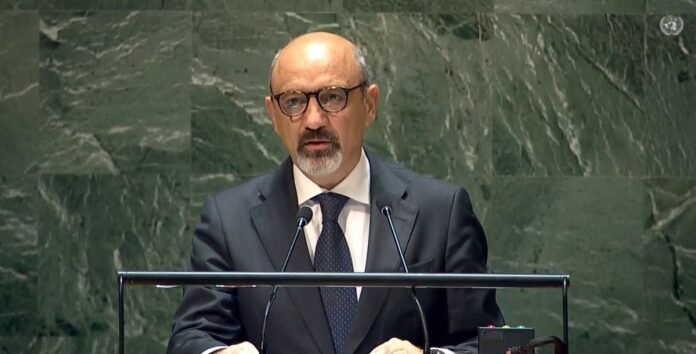NEW YORK, JUNE 23 – At today’s General Assembly debate, Italy’s reaffirmed its support for the Responsability to Protect (R2P) principles to prevent the risk of atrocity crimes. Prioritizing prevention requires strengthening the protection of children and promoting education as a fundamental tool to fight hate and disseminate the value of tolerance were stressed by the Deputy Permanent Representative to the UN, Ambassador Stefano Stefanile.
 The meeting was convened to discuss the Secretary General report on “Children, Youth and the Responsibility to Protect”, presented by Alice Wairimu Nderitu, Under-Secretary-General Special Adviser on the Prevention of Genocide. Over 60 member states asked to address the Assembly. In 2005, the Unite Nations unanimously agreed on the international community’s responsibility to protect populations from genocide, war crimes, ethnic cleansing and crimes against humanity. Today our world is confronted by unprecedented levels of violence, atrocities and displacement.
The meeting was convened to discuss the Secretary General report on “Children, Youth and the Responsibility to Protect”, presented by Alice Wairimu Nderitu, Under-Secretary-General Special Adviser on the Prevention of Genocide. Over 60 member states asked to address the Assembly. In 2005, the Unite Nations unanimously agreed on the international community’s responsibility to protect populations from genocide, war crimes, ethnic cleansing and crimes against humanity. Today our world is confronted by unprecedented levels of violence, atrocities and displacement.
“Prevention is indeed the key to guaranteeing the safety of children and youth from atrocity crimes”, said Secretary General, Antonio Guterres. Continued operationalisation of the Responsibility to Protect also means tackling the underlying causes that can provide fertile ground for atrocity mind-sets to grow.
Before speaking to the GA, Nderitu had addressed the Security Council: “Hateful and contentious narratives that form in the wake of growing hostility, violence and discrimination, could have a devastating impact on societies at large”, she said: “We saw it in the lead up to the Holocaust, in Rwanda in 1994” and also in the ethnically-charged Bosnia conflict between Muslims, Serbs and Croats in the mid-1990s, she said, reminding that “ending wars require sustained actions”, including countering acrimonious rhetoric, hate speech online and offline, and rights violations that impact lives and livelihoods. (@OnuItalia)

